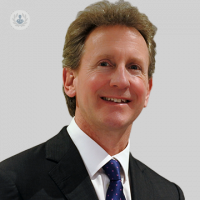Treating thyroid lumps – when should you have surgery?
Written by:Thyroid lumps are common – it’s estimated that nodules or lumps could be present in half the population. In this article, the second in a two-part series on thyroid lumps, leading consultant ENT surgeon Mr Brian Fish explains when surgery is the best treatment option and what the procedure involves.

How are thyroid lumps treated?
If a thyroid lump is found to be benign and is not causing any symptoms then it may require no treatment at all.
However, some benign lumps can cause symptoms if they are large enough. They may cause a feeling of pressure, or cause difficulty in swallowing in which case surgical removal will be considered. If the diagnosis is unclear following the needle test, then the half of the gland containing the nodule may be removed to establish a firm diagnosis.
If the lump is cancerous then the mainstay of treatment is surgery with either removal of half or all of the gland. This may be followed by treatment with radioactive iodine. Thyroid surgery may also be recommended for an overactive gland which may not be nodular.
Thyroid surgery
Surgery usually involves removing half of the thyroid gland (hemithyroidectomy or thyroid lobectomy) or the whole gland (total thyroidectomy). Subtotal thyroidectomies where a small part of the gland is left used to be popular – particularly when treating an overactive gland – but this is rarely performed now.
The surgery is performed under a general anaesthetic and usually involves an overnight stay. In selected cases it may be possible to perform removal of half of the gland as a day case.
As with all surgery there are risks involved, but the chance of a complication is very low. The main risks for either type of surgery are:
- bleeding
- infection
- voice change
- underactivity of the gland if half of it is removed.
If the whole gland is removed, there is also a risk of low calcium levels in the blood. This may require replacement either temporarily or for life. Finally, there is a very low risk of problems with breathing.
Your thyroid surgeon should be able to tell you about all of these risks in more detail, including their own complication rates. Thyroid surgeons in the UK are obliged to enter their outcomes from thyroid surgery every year into a national audit run by the British Association of Endocrine and Thyroid Surgeons (BAETS).
Recovery after thyroid surgery
Normally it takes 2-3 weeks to recover from thyroid surgery. There are both the physical aspects of it such as wound healing and the hormonal aspects.
If half of the gland is removed then in the majority of cases the remaining half of the gland can work harder to produce extra thyroid hormones. This may take some weeks, so you may feel overly tired and lethargic during this period.
In some cases the thyroid does not have that reserve capacity and so you need to be on thyroid hormone replacement for life (a tablet a day). Usually a blood test is taken after 4-6 weeks to see whether supplementation is required.
In the long term, once you are on the correct dose of thyroxine there should be no ongoing symptoms (such as tiredness or weight gain) and the levels need only be checked annually.
To book a consultation with Mr Brian Fish, click here.


